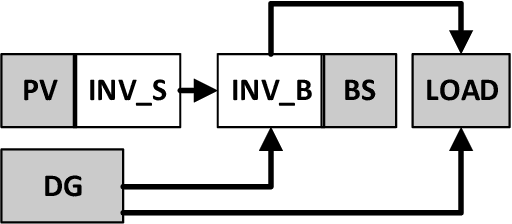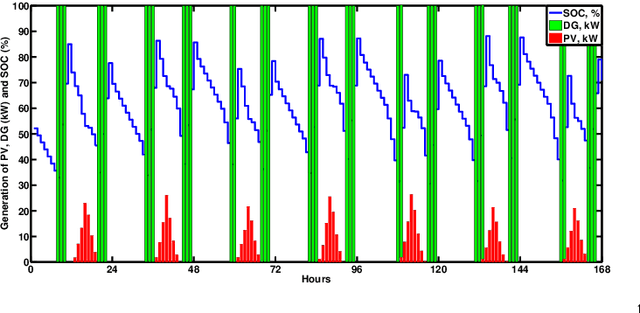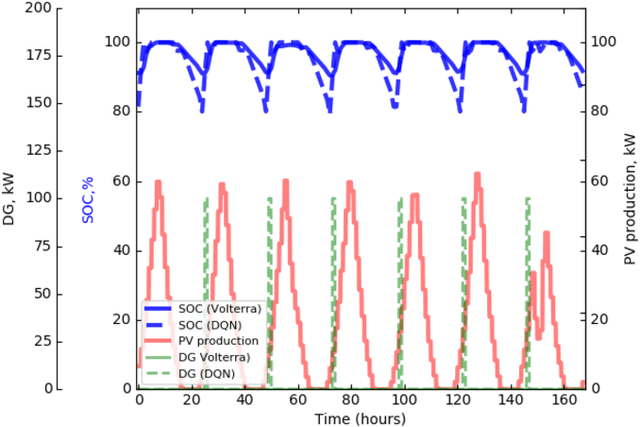Nikita Tomin
A Dynamic Analysis of Energy Storage with Renewable and Diesel Generation using Volterra Equations
Aug 04, 2019



Abstract:Energy storage systems will play a key role in the power system of the twenty first century considering the large penetrations of variable renewable energy, growth in transport electrification and decentralisation of heating loads. Therefore reliable real time methods to optimise energy storage, demand response and generation are vital for power system operations. This paper presents a concise review of battery energy storage and an example of battery modelling for renewable energy applications and second details an adaptive approach to solve this load levelling problem with storage. A dynamic evolutionary model based on the first kind Volterra integral equation is used in both cases. A direct regularised numerical method is employed to find the least-cost dispatch of the battery in terms of integral equation solution. Validation on real data shows that the proposed evolutionary Volterra model effectively generalises conventional discrete integral model taking into account both state of health and the availability of generation/storage.
* 9 pages, 12 figures; accepted to IEEE Transactions on Industrial Informatics
The Concept of the Deep Learning-Based System "Artificial Dispatcher" to Power System Control and Dispatch
May 07, 2018


Abstract:Year by year control of normal and emergency conditions of up-to-date power systems becomes an increasingly complicated problem. With the increasing complexity the existing control system of power system conditions which includes operative actions of the dispatcher and work of special automatic devices proves to be insufficiently effective more and more frequently, which raises risks of dangerous and emergency conditions in power systems. The paper is aimed at compensating for the shortcomings of man (a cognitive barrier, exposure to stresses and so on) and automatic devices by combining their strong points, i.e. the dispatcher's intelligence and the speed of automatic devices by virtue of development of the intelligent system "Artificial dispatcher" on the basis of deep machine learning technology. For realization of the system "Artificial dispatcher" in addition to deep learning it is planned to attract the game theory approaches to formalize work of the up-to-date power system as a game problem. The "gain" for "Artificial dispatcher" will consist in bringing in a power system in the normal steady-state or post-emergency conditions by means of the required control actions.
Ensemble Methods of Classification for Power Systems Security Assessment
Jan 07, 2016



Abstract:One of the most promising approaches for complex technical systems analysis employs ensemble methods of classification. Ensemble methods enable to build a reliable decision rules for feature space classification in the presence of many possible states of the system. In this paper, novel techniques based on decision trees are used for evaluation of the reliability of the regime of electric power systems. We proposed hybrid approach based on random forests models and boosting models. Such techniques can be applied to predict the interaction of increasing renewable power, storage devices and swiching of smart loads from intelligent domestic appliances, heaters and air-conditioning units and electric vehicles with grid for enhanced decision making. The ensemble classification methods were tested on the modified 118-bus IEEE power system showing that proposed technique can be employed to examine whether the power system is secured under steady-state operating conditions.
Power System Parameters Forecasting Using Hilbert-Huang Transform and Machine Learning
Apr 09, 2014



Abstract:A novel hybrid data-driven approach is developed for forecasting power system parameters with the goal of increasing the efficiency of short-term forecasting studies for non-stationary time-series. The proposed approach is based on mode decomposition and a feature analysis of initial retrospective data using the Hilbert-Huang transform and machine learning algorithms. The random forests and gradient boosting trees learning techniques were examined. The decision tree techniques were used to rank the importance of variables employed in the forecasting models. The Mean Decrease Gini index is employed as an impurity function. The resulting hybrid forecasting models employ the radial basis function neural network and support vector regression. Apart from introduction and references the paper is organized as follows. The section 2 presents the background and the review of several approaches for short-term forecasting of power system parameters. In the third section a hybrid machine learning-based algorithm using Hilbert-Huang transform is developed for short-term forecasting of power system parameters. Fourth section describes the decision tree learning algorithms used for the issue of variables importance. Finally in section six the experimental results in the following electric power problems are presented: active power flow forecasting, electricity price forecasting and for the wind speed and direction forecasting.
 Add to Chrome
Add to Chrome Add to Firefox
Add to Firefox Add to Edge
Add to Edge